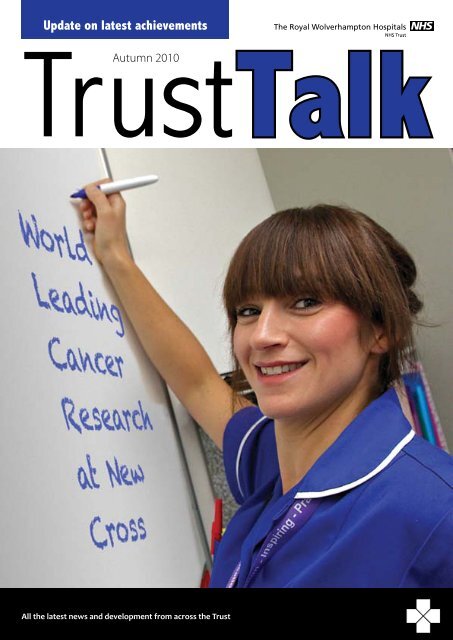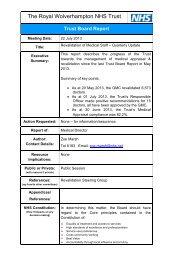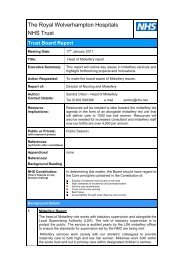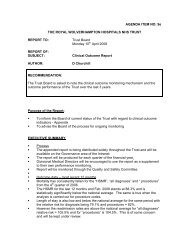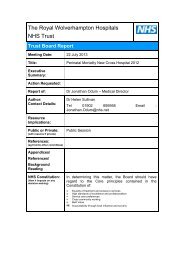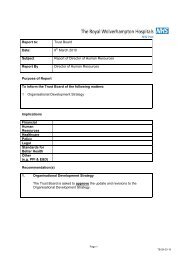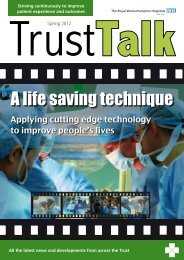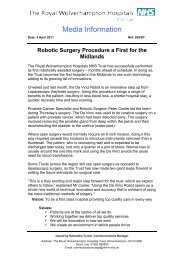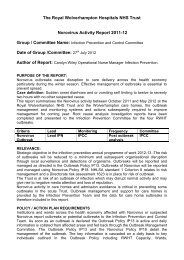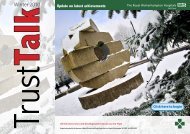Update on latest achievements - The Royal Wolverhampton ...
Update on latest achievements - The Royal Wolverhampton ...
Update on latest achievements - The Royal Wolverhampton ...
Create successful ePaper yourself
Turn your PDF publications into a flip-book with our unique Google optimized e-Paper software.
<str<strong>on</strong>g>Update</str<strong>on</strong>g> <strong>on</strong> <strong>latest</strong> <strong>achievements</strong><br />
TrustTalk<br />
Autumn 2010<br />
All the <strong>latest</strong> news and development from across the Trust
C<strong>on</strong>tents<br />
1<br />
Autumn 2010<br />
Our <strong>latest</strong> <strong>achievements</strong><br />
3 Heart and Lung Centre Busiest<br />
903 cardiac operati<strong>on</strong>s were performed at the<br />
centre during 2009-2010<br />
4 Charitable Trust Buys New Equipment<br />
Find out how the cash has been spent to<br />
introduce new equipment that will benefit<br />
patients<br />
5 New Health Service Chairman<br />
Well known local health chief begins his four<br />
year appointment with the Trust<br />
5 Improvements planned for Stroke Unit<br />
New plans set to increase capacity of the unit<br />
through team expansi<strong>on</strong> and a new physician<br />
7 Focus <strong>on</strong> TPOT Thinking<br />
Taking a closer look at the Productive Operating<br />
<strong>The</strong>atre Programme and how it works<br />
Awards<br />
8 PEAT Rates Trust Highly<br />
One out of just 40 hospitals to achieve triple<br />
excellence for maintaining a quality envir<strong>on</strong>ment<br />
8 Midwifery Award for Normal Childbirth<br />
Maternity unit recognised for inspirati<strong>on</strong>al work<br />
<strong>on</strong> improving local maternity services<br />
Medical Feature<br />
9 World Leading Cancer Research<br />
<strong>The</strong> <strong>latest</strong> <strong>on</strong> trials that have helped put New<br />
Cross <strong>on</strong> the map as a leading cancer centre<br />
Latest <str<strong>on</strong>g>Update</str<strong>on</strong>g>s<br />
11 Transforming Community Services<br />
Achieving greater service integrati<strong>on</strong> through a<br />
structured reform of community services<br />
12 R&D Latest<br />
An insight into the team dedicated to seeking<br />
innovati<strong>on</strong>s that will help patients<br />
13 MRSA Dispelling the Myths<br />
Dispelling some of the myths surrounding MRSA<br />
infecti<strong>on</strong> in hospitals<br />
Staff Shout<br />
15 Trust Midwife’s Charity Bike Ride<br />
Midwife’s physical and mental endurance put to<br />
the test in aid of Nati<strong>on</strong>al charity<br />
16 Ne<strong>on</strong>atal Unit Receives D<strong>on</strong>ati<strong>on</strong>s<br />
Special thanks to the people who’ve supported<br />
the unit with their generous d<strong>on</strong>ati<strong>on</strong>s<br />
16 Footy Team Tackles NHS Tournament<br />
5-aside team represents Trust in nati<strong>on</strong>al football<br />
event<br />
17 Trusts Marath<strong>on</strong> Activities for Dementia Care<br />
Staff step up to the challenge to help raise more<br />
m<strong>on</strong>ey towards dementia project<br />
18 Retail Survey Winner<br />
Survey captures informati<strong>on</strong> from staff to help<br />
shape Trust’s retail strategy<br />
18 New Patient Care Pathway Launches<br />
Providing the best quality care possible for<br />
patients at the end of their life<br />
18 New Catering Facility Opens<br />
A £3 milli<strong>on</strong> investment to provide better quality<br />
food and more choice and flexibility for patients<br />
History<br />
19 Florence Nightingale<br />
Trust marks 100th anniversary of Nightingale’s<br />
death with a look at how she influenced today’s<br />
nursing<br />
Have you got any stories for the next editi<strong>on</strong> of<br />
Trust Talk?<br />
<strong>The</strong>n c<strong>on</strong>tact the Communicati<strong>on</strong>s Department <strong>on</strong><br />
01902 695900 or email samanthaturner@nhs.net<br />
If you require this magazine in another format please<br />
c<strong>on</strong>tact the Communicati<strong>on</strong>s Team <strong>on</strong>:<br />
01902 695900<br />
or would like to share your thoughts <strong>on</strong> Trust Talk.<br />
4 15 17 19<br />
Welcome from the<br />
Chief Executive<br />
Barry Picken,<br />
Chairman<br />
Well, it’s been a busy Summer here at the Trust and<br />
we’ve also welcomed a new Chairman into the fold.<br />
Barry Picken has a wealth of experience in the health<br />
sector, having been <strong>on</strong> the Board of the Wolverhampt<strong>on</strong><br />
PCT and as a lay assessor for the General Medical<br />
Council. He is also a magistrate and a member of the<br />
West Midlands Police Authority. His appointment is a<br />
good move for us at such an exciting time of c<strong>on</strong>tinuous<br />
development and <strong>achievements</strong> across the Trust.<br />
“I’m delighted to be taking up the role as chairman of<br />
the Trust at such a challenging time,” says Barry. “In the<br />
coming m<strong>on</strong>ths the Hospital has to achieve Foundati<strong>on</strong><br />
Trust status, as well as deliver the Transforming<br />
Community Services agenda, involving the transfer<br />
of over 1,000 staff and services from the PCT to the<br />
Hospital.”<br />
This Autumn issue sees more of our <strong>achievements</strong><br />
as a Trust, but also tells some of the stories behind<br />
our successes, such as our cancer services, which are<br />
renowned as a world class facility and our Heart and<br />
Lung Centre, which is the busiest in the regi<strong>on</strong>. Research<br />
and Development is another growing area for us. We<br />
saw an income of £3.7 milli<strong>on</strong> generated from our<br />
innovati<strong>on</strong>s last year al<strong>on</strong>e.<br />
As we go to press, we await news <strong>on</strong> our Foundati<strong>on</strong><br />
Trust status and will c<strong>on</strong>tinue to keep you informed <strong>on</strong><br />
this. We are hopeful that, by the end of this year, our<br />
applicati<strong>on</strong> for status will be approved. More <strong>on</strong> this will<br />
be in our winter editi<strong>on</strong> of Trust Talk.<br />
Thanks to every<strong>on</strong>e, both our staff and our patients,<br />
for helping make New Cross <strong>on</strong>e of the best hospital<br />
facilities around.<br />
Enough from us now! Please enjoy reading this issue, so<br />
we can bring you up to date with what’s happening here<br />
in Wolverhampt<strong>on</strong>…<br />
David Lought<strong>on</strong> CBE<br />
Chief Executive<br />
David Lought<strong>on</strong> CBE,<br />
Chief Executive<br />
From the top<br />
2
Achievements<br />
3<br />
Heart & Lung<br />
Centre Busiest<br />
For the third year running, the Heart and<br />
Lung Centre at Wolverhampt<strong>on</strong>’s New<br />
Cross Hospital is the most active cardiac<br />
surgery unit in the West Midlands.<br />
<strong>The</strong>re are a total of four units across<br />
the regi<strong>on</strong> and the Trust performed<br />
903 cardiac operati<strong>on</strong>s during 2009 to<br />
2010. Since opening in October 2004,<br />
over 5200 cardiac operati<strong>on</strong>s have been<br />
carried out – that’s an average of 72 a<br />
m<strong>on</strong>th, or 864 a year.<br />
Such a high level of activity has been<br />
achieved without comprising the quality<br />
of care delivered. Data from Dr Foster,<br />
the UK's leading provider of comparative<br />
informati<strong>on</strong> <strong>on</strong> health and social care<br />
services, shows that the Heart and Lung<br />
Centre was the best in the country. It had<br />
the lowest relative risks of mortality and<br />
shortest length of stay for cardiac surgery<br />
from 2009 to 2010.<br />
Chief Executive, David Lought<strong>on</strong> CBE,<br />
explained why this is such a significant<br />
achievement: “I’m immensely proud of<br />
what the staff in the Heart and Lung<br />
Centre have achieved since it opened.<br />
When I took up post here, I thought the<br />
unit may lose £10m a year. Never in my<br />
wildest expectati<strong>on</strong>s did I think it would<br />
go <strong>on</strong> to become <strong>on</strong>e of the best Heart<br />
and Lung Centres in the country. <strong>The</strong><br />
staff really have d<strong>on</strong>e a fantastic job.”<br />
This year, the Trust <strong>on</strong>ce again received<br />
an excellence rating from the Care<br />
Quality Commissi<strong>on</strong> for its quality of<br />
services.<br />
<strong>The</strong> Heart & Lung Centre<br />
at New Cross Hospital<br />
For the third year running, the Heart and<br />
Lung Centre at Wolverhampt<strong>on</strong>’s New Cross<br />
Hospital is the most active cardiac surgery unit<br />
in the West Midlands.<br />
Charitable Trust Buys<br />
New Equipment<br />
Glaucoma Laser System<br />
Phil Parkes, Mr Isgar and Trevor Mitchel<br />
Sun Nuclear MapCHECK2 IMRT QA System<br />
3D Toe Imaging System<br />
Thanks to cash from the Charitable Trust, we’ve been able to buy a range of<br />
equipment to help provide the best possible services for our patients.<br />
<strong>The</strong> Bioptics Digital System was introduced into the nucleus breast theatre in<br />
May 2010. It means that x-rays of breast lesi<strong>on</strong>s can be taken in theatre, which<br />
instantly produce images for analysis.<br />
Before this, breast tissue had to be taken to the Breast Imaging Department and<br />
hard copies of x-rays had to be returned to theatre before the operati<strong>on</strong> could be<br />
completed.<br />
“This new x-ray equipment saves around 20 minutes per operati<strong>on</strong>, in terms of<br />
anaesthetic and operating time,” explained T<strong>on</strong>y Wilding, Directorate Manager for<br />
Surgery and Urology.<br />
<strong>The</strong> Bioptics equipment cost £49,750, thanks to cash from the Breast Care Acti<strong>on</strong><br />
Group Nurses Trust Fund and the Deanesly Centre Trust Fund.<br />
“This kit was dedicated to Maureen Parkes, an enthusiastic fund raiser for breast<br />
cancer patients in Wolverhampt<strong>on</strong>, who sadly passed away before the machine<br />
was installed,” said T<strong>on</strong>y.<br />
Full details of other equipment purchased will appear in the Charitable Trust<br />
Fund’s Annual Report.<br />
Equipment funded through the Charitable Trust<br />
Equipment Cost Funded by<br />
Bioptics piXarray Digital System £49.750 Deanesly Trust Fund<br />
Glaucoma Laser System £33,310<br />
Ophthalmology Trust Fund,<br />
League of Friends<br />
3D TOE Imaging System £33,448 Cardiothoracic Trust Fund<br />
Sun Nuclear MapCHECK2 IMRT<br />
QA System<br />
£24,000 Deanesly Trust Fund<br />
4
Achievements<br />
5<br />
New Health<br />
Service Chairman<br />
<strong>The</strong> new Chairman of our Trust is well<br />
known local health chief, Barry Picken.<br />
Barry began his four year appointment<br />
<strong>on</strong> 1 September 2010, which runs<br />
until August 2014. <strong>The</strong> appointment<br />
was made in accordance with the<br />
Commissi<strong>on</strong>er for Public Appointments’<br />
Code of Practice.<br />
Living in Wolverhampt<strong>on</strong>, Barry has<br />
been involved in healthcare in the city<br />
since 2002, when he became a n<strong>on</strong><br />
executive director of Wolverhampt<strong>on</strong><br />
Primary Care Trust (PCT). He became<br />
chair of the PCT in 2006, a role he stood<br />
down from to take up this new post.<br />
Mr Picken said: “I’m delighted to<br />
be taking up the role as chairman<br />
of the Trust at such an exciting and<br />
challenging time. <strong>The</strong> NHS is about<br />
to enter a period of substantial<br />
challenge and I’m very c<strong>on</strong>scious of the<br />
resp<strong>on</strong>sibility of leading the Hospital<br />
through this.”<br />
Chief Executive, David Lought<strong>on</strong> CBE<br />
said: “I’d like to take this opportunity<br />
to warmly welcome Barry as our<br />
new Chairman here at the Trust.<br />
His experience in the community<br />
and voluntary sectors will be really<br />
important in supporting us to improve<br />
services for patients.<br />
“I’m particularly pleased because of the<br />
reassurance it should give to the 1,000<br />
staff that will transfer from the PCT to<br />
the Trust, as part of the Government’s<br />
initiative <strong>on</strong> Transforming Community<br />
Services. We will also benefit from<br />
the fact that Barry has a wealth of<br />
experience in the management of these<br />
services”.<br />
Improvements Planned for Stroke Unit<br />
A Nati<strong>on</strong>al audit, which m<strong>on</strong>itors hospital stroke units,<br />
puts New Cross in the top half of Acute Trusts for its<br />
facilities and services in this specialist area.<br />
<strong>The</strong> Nati<strong>on</strong>al Sentinel Audit for Stroke report says an<br />
efficient service is being provided at the Trust, and also<br />
identified areas for improvement: “Several Nati<strong>on</strong>al<br />
initiatives have been introduced over the past year<br />
and these have changed the standards we now need<br />
to meet,” said Chief Executive, David Lought<strong>on</strong> CBE.<br />
“<strong>The</strong> Accelerati<strong>on</strong> Improvement Programme and<br />
brand new stroke guidelines means all Trusts<br />
have been asked to increase the number of direct<br />
admissi<strong>on</strong>s to the stroke unit. This, together with our<br />
need to increase capacity, and make sure we have<br />
stroke expertise here seven days a week, led us to<br />
New Trust Chairman<br />
Barry Picken<br />
create an acti<strong>on</strong> plan to improve what we can deliver<br />
here.”<br />
Plans include the appointment of a new Stroke<br />
Physician and expansi<strong>on</strong> of the Community<br />
Rehabilitati<strong>on</strong> Team. Recruitment and training for<br />
these enhancements should begin by the end of 2010.<br />
<strong>The</strong> Trust’s Acute Stroke Unit has 23 beds. It admitted<br />
750 patients between June 2009 and June 2010,<br />
including people from Wolverhampt<strong>on</strong>, the South<br />
Staffordshire ‘fringe’ and referrals from Stafford and<br />
Cannock.<br />
“Having identified what we need to become even<br />
better, we’re c<strong>on</strong>fident our stroke unit will develop<br />
into <strong>on</strong>e that our staff and the local populati<strong>on</strong> can be<br />
even more proud of,” said David.<br />
Exercise<br />
Short<br />
Fuse<br />
Success!<br />
A joint exercise with the Fire Service, to<br />
test out plans for dealing with chemical<br />
incidents, has been held at the Trust.<br />
Operati<strong>on</strong> Short Fuse was designed<br />
to see how effectively we can manage<br />
incidents of this kind and provide a<br />
more integrated resp<strong>on</strong>se with the fire<br />
service.<br />
<strong>The</strong> exercise was based <strong>on</strong> a small<br />
explosi<strong>on</strong> within a chemical store<br />
at New Cross Hospital. <strong>The</strong> ficti<strong>on</strong>al<br />
‘blast’ meant some of the chemicals<br />
may have been exposed to 12 people<br />
working in the stores area at the time.<br />
Live casualties were presented to the<br />
exercise team with the aim of rescuing<br />
all saveable life; handing casualties <strong>on</strong><br />
to the hospital for dec<strong>on</strong>taminati<strong>on</strong><br />
and identifying substances to influence<br />
<strong>on</strong>going treatment by the medical<br />
team. <strong>The</strong> exercise tested the Trust’s<br />
security resilience in the event of an<br />
incident threat. It was filmed and<br />
photographed for use at future training<br />
events and was an opportunity to<br />
analyse joint working; people’s roles<br />
and resp<strong>on</strong>sibilities and incident scene<br />
management. A wide range of staff<br />
were involved in the exercise, including<br />
Porters, A&E Nursing & Recepti<strong>on</strong>,<br />
Security and Medical Physics, who<br />
provided support in relati<strong>on</strong> to<br />
chemicals.<br />
“Huge thanks to every<strong>on</strong>e involved in<br />
this exercise,” explained Diane Prest<strong>on</strong>,<br />
Head of Emergency Preparedness at<br />
the Trust. “It certainly dem<strong>on</strong>strated<br />
our resilience in the event of a chemical<br />
incident and tested out our new<br />
dec<strong>on</strong>tainer unit. It was really helpful<br />
to work so closely with the fire service<br />
and identify any issues that could arise<br />
during an incident like this.”<br />
6
Team Focus<br />
"Touring staff<br />
around the<br />
department<br />
to see the<br />
results for<br />
themselves<br />
shows them<br />
the real<br />
benefits of<br />
taking this<br />
approach."<br />
7<br />
Focus <strong>on</strong> -<br />
T-POT Thinking<br />
Since its Nati<strong>on</strong>al launch, in<br />
September 2009, <strong>The</strong> Productive<br />
Operating <strong>The</strong>atre programme,<br />
(T-POT), has played a fundamental<br />
role in helping theatre teams work<br />
together more effectively.<br />
<strong>The</strong> programme seeks to improve<br />
the patient experience, the safety and<br />
outcomes of surgical services and<br />
more effective use of theatre time.<br />
Clare Nash is the Programme’s<br />
Manager here at the Trust: “T-POT<br />
was officially launched to staff at<br />
the end of July and follows the<br />
highly successful Productive Ward<br />
Programme. This new initiative<br />
will focus <strong>on</strong> two of the hospital’s<br />
theatres; Nucleus 3 and Beyn<strong>on</strong>, with<br />
plans to roll it out to the others later<br />
<strong>on</strong>.”<br />
‘Building Teams for Safer Care’ is<br />
the slogan behind the programme. It<br />
looks at how the department is doing<br />
and what can be improved in the key<br />
areas of: safety and reliability; patient<br />
experience and outcome; team<br />
performance, staff wellbeing and<br />
value and efficiency.<br />
A Systematic Approach<br />
“It’s all about taking a systematic<br />
approach,” explains Clare. “It looks<br />
at each element and unpicks each<br />
<strong>on</strong>e, finding out where the wastage<br />
is and stripping out any unnecessary<br />
waste steps. It’s about smarter ways<br />
of working and giving people the<br />
tools to help them be more efficient<br />
and further develop the service.”<br />
It’s hoped that, by using this<br />
approach, theatre teams will be in<br />
a better positi<strong>on</strong> to reduce waiting<br />
list times, reduce the extra hours<br />
staff need to work and get through<br />
operating lists more quickly.<br />
Top 7 Priorities<br />
Fifty staff attended the launch’s<br />
visi<strong>on</strong>ing workshop, which included<br />
theatre staff, support staff and<br />
clinicians. <strong>The</strong>y were tasked with<br />
creating a list of Top 7 acti<strong>on</strong>s<br />
which, in their view, would make<br />
their working day ‘perfect.’ <strong>The</strong> list<br />
includes things like, having enough<br />
recovery staff, starting <strong>on</strong> time and<br />
better scheduling. Staff then voted<br />
<strong>on</strong> these in order of priority. <strong>The</strong>y<br />
put having all equipment and sets<br />
ready to go top of the list. “Getting<br />
people from all levels together was<br />
Staff getting involved in the visi<strong>on</strong>ing workshop<br />
really helpful, because it allowed<br />
people to appreciate the issues and<br />
the difficulties faced by their fellow<br />
colleagues,” said Clare.<br />
Chief Executive, David Lought<strong>on</strong><br />
attended the launch. He emphasised<br />
that TPOT is about improving<br />
working lives for the staff as well as<br />
improving the safety and reliability<br />
of care. It’s not about saving m<strong>on</strong>ey.<br />
Measurement workshops also took<br />
place in August, where teams chose<br />
their own local measurements based<br />
<strong>on</strong> the Top 7 priorities.<br />
<strong>The</strong> Benefits<br />
<strong>The</strong> success of the Productive Ward<br />
Programme showed how beneficial<br />
this type of approach can be. Laura<br />
Patrick is a Staff Nurse and found<br />
Productive Ward incredibly useful:<br />
“A lot of the time we couldn’t find<br />
anything so we would re-order it. We<br />
had a treatment room which was also<br />
used for drug preparati<strong>on</strong>. Children<br />
undergoing treatment are already<br />
nervous so having people coming in<br />
and out all the time didn’t help. Now,<br />
we have a drug preparati<strong>on</strong> room<br />
and a separate treatment room –<br />
with no more interrupti<strong>on</strong>s!”<br />
Engaging with staff is an equally<br />
important aspect of the programme.<br />
“Touring staff around the<br />
department to see the results for<br />
themselves shows them the real<br />
benefits of taking this approach.<br />
We’ve also linked up with several<br />
regi<strong>on</strong>al hospitals to share each<br />
other’s learning and ideas from the<br />
programme,” said Clare.<br />
Clinicians have been briefed at<br />
directorate meetings and the<br />
programme has also been featured at<br />
Senior Managers Briefing. All staff<br />
can access the <strong>latest</strong> updates <strong>on</strong> the<br />
programme through the home page<br />
of the intranet.<br />
Joint Seminar<br />
<strong>The</strong> <strong>Royal</strong> College of Surge<strong>on</strong>s<br />
and the NHS Institute held a joint<br />
seminar in September to talk about<br />
the important role surge<strong>on</strong>s and<br />
anaesthetists c<strong>on</strong>tinue to play within<br />
the programme. It highlighted how,<br />
as the NHS enters a critical time,<br />
surge<strong>on</strong>s and anaesthetists can<br />
embrace the programme, be at the<br />
forefr<strong>on</strong>t of quality improvements<br />
and make a real difference for<br />
patients and staff.<br />
About the Team<br />
Led by Clare Nash, the programme<br />
team has a lead Matr<strong>on</strong> and<br />
includes a project facilitator, with<br />
support from admin and the service<br />
improvement team. It expects to<br />
collect some baseline data around<br />
sets of equipment being ready and<br />
lists being kept to, which will help<br />
measure the positive outcomes of the<br />
programme.<br />
<strong>The</strong> Productive Operati<strong>on</strong> <strong>The</strong>atre<br />
'PEAT'<br />
Rates Trust<br />
Highly<br />
Ivan Little, left and Sandra Roberts, pictured right, receive their<br />
certificates from Chief Executive, David Lought<strong>on</strong> CBE.<br />
Midwifery<br />
Award for<br />
Normal<br />
Childbirth<br />
<strong>The</strong> maternity unit is celebrating after winning an award<br />
from the All-Party Parliamentary Group <strong>on</strong> Maternity<br />
(APPGM).<br />
<strong>The</strong> Trust was recognised in the Normality in Childbirth<br />
category at the awards, which acknowledge inspiring or<br />
innovative work in improving local maternity services.<br />
<strong>The</strong>y were presented at the APPGM summer recepti<strong>on</strong><br />
in July, at the Houses of Parliament.<br />
<strong>The</strong> APPGM, which is serviced by the NCT charity, is<br />
a cross-party group whose aim is to highlight maternity<br />
issues within Parliament and bring together health<br />
professi<strong>on</strong>als and service users with politicians.<br />
<strong>The</strong> team at New Cross Hospital developed a<br />
standardised model of care for high risk women in<br />
labour and their partners. This model aims to maximise<br />
the opportunity for normal birth and promote a positive<br />
birth experience.<br />
<strong>The</strong> Nati<strong>on</strong>al Patient Safety Agency has rated the Trust<br />
excellent in all three areas when treating patients in a<br />
cleaner and better maintained envir<strong>on</strong>ment.<br />
<strong>The</strong> Patient Envir<strong>on</strong>ment Acti<strong>on</strong> Team, (PEAT),<br />
assesses all hospitals and inpatient units with 10<br />
or more beds. <strong>The</strong> teams are made up of nurses,<br />
matr<strong>on</strong>s, doctors, catering staff, domestic service<br />
managers, patients and the public. <strong>The</strong>y scrutinise<br />
levels of cleanliness, aspects of infecti<strong>on</strong> c<strong>on</strong>trol, the<br />
quality of the envir<strong>on</strong>ment and the standard of the<br />
food.<br />
Hospitals are scored; excellent, good, acceptable,<br />
poor or unacceptable. Wolverhampt<strong>on</strong> was rated<br />
excellent in all three PEAT categories – <strong>on</strong>e of <strong>on</strong>ly 40<br />
out of 1,242 hospitals to achieve this.<br />
Divisi<strong>on</strong>al Manager for Estates and Facilities, Graham<br />
Argent, explained why these ratings are so important:<br />
“To have achieved the triple excellence rating puts us<br />
firmly in the upper quartile of hospital performers. It’s<br />
a real dem<strong>on</strong>strati<strong>on</strong> of our determinati<strong>on</strong> to be the<br />
best and we’re totally committed to maintaining this<br />
rating for the benefit of our patients.”<br />
Estates and Facilities Manager, Ivan Little and Sandra<br />
Roberts, Head of Hotel Services were presented<br />
with certificates by the Trust’s Chief Executive, in<br />
recogniti<strong>on</strong> of their efforts towards this.<br />
PEAT scores are c<strong>on</strong>ducted annually, with assessments<br />
carried out between January and March.<br />
<strong>The</strong> birth envir<strong>on</strong>ment has been adapted to be<br />
c<strong>on</strong>ductive to normal birth, with a range of birthing aids<br />
including birthing balls and stools. This informati<strong>on</strong> will<br />
be given to all members of the maternity team over the<br />
next few m<strong>on</strong>ths.<br />
Dr Dan Poulter MP, Chair of the APPGM, said: “It’s a<br />
privilege to present these awards to such deserving and<br />
exemplary maternity units. <strong>The</strong> winning units’ innovative<br />
work will be an inspirati<strong>on</strong> to other Trusts.”<br />
Awards<br />
Receiving their award are Matr<strong>on</strong> Tracy Palmer and midwives Lyndsay Durkin, Joanne Ridley and Cath Denyer.<br />
Photograph supplied by Lyndsay Durkin.<br />
8
Medical Feature<br />
9<br />
World leading Cancer<br />
Research at New Cross<br />
Cancer of the oesophagus has increased,<br />
with deaths from the disease<br />
rising by 50% over the last 20 years.<br />
Professor David Ferry<br />
This growth in oesophageal cancer is the largest<br />
increase of any cancer in the Western world.<br />
Last year, there were over 16,000 cases. 13,000<br />
oesophagogastric cancer deaths make this the third<br />
leading cause of cancer death in the UK – causing<br />
more deaths than breast cancer.<br />
<strong>The</strong>re are no useful screening tests <strong>on</strong> the horiz<strong>on</strong> and<br />
less than 10% of patients are cured by surgery, so the<br />
need for new medicines is hugely important. Upper<br />
gastrointestinal cancers is <strong>on</strong>e of the ‘Cinderella’ areas<br />
of cancer care, but recent advances in research are<br />
changing this.<br />
Oesopohagus<br />
COG trial<br />
Getinib<br />
Targets EGF receptor<br />
Stomach<br />
GRANITE trial<br />
Everolimus<br />
Targets mTOR<br />
Gefitinib is a new drug. It could help patients with<br />
advanced incurable oesophageal cancer. Gefitinib<br />
works by inhibiting growth receptors <strong>on</strong> the surface<br />
of cells, leading to cell death and shrinkage of cancers.<br />
Gefitinib is taken orally, <strong>on</strong>ce a day and although it<br />
can cause teenage spots and sometimes diarrhoea,<br />
it doesn’t cause the traditi<strong>on</strong>al side effects that<br />
chemotherapy does. Gefitinib is <strong>on</strong>e of the new<br />
drugs at the forefr<strong>on</strong>t of what is called pers<strong>on</strong>alised<br />
medicine.<br />
Clinical research into gefitinib began in 1999, when<br />
Professor David Ferry and his colleagues presented<br />
the first phase <strong>on</strong>e clinical trial data <strong>on</strong> Gefitinib<br />
at the American Society of Clinical Oncology. This<br />
drug became widely used in lung cancer, but in<br />
2007, Professor Ferry published the effectiveness of<br />
Gefitinib in a phase II clinical trial. All the patients in<br />
this trial were treated at New Cross Hospital, but many<br />
were referred from c<strong>on</strong>sultants at other hospitals. This<br />
led to the launch of phase III, the Cancer Oesophagus<br />
Gefitinib (COG) trial, led by Professor Ferry and run<br />
from the trials unit at Oxford University.<br />
Cancer Research UK (CRUK) awarded grants of £500<br />
000 to fund the COG trial. Gefitinib, which costs £5000<br />
per m<strong>on</strong>th, is provided free to patients by AstraZeneca<br />
as part of a grant in aid. This shows the huge benefits<br />
clinical trials can offer patients who would otherwise<br />
<strong>on</strong>ly receive palliative care. <strong>The</strong> total commercial<br />
value of the drugs d<strong>on</strong>ated is over £6 milli<strong>on</strong>, which<br />
illustrates the sums involved in research at this level.<br />
Because half the patients in COG get a placebo, there<br />
are challenges to recruiting patients for the trial.<br />
However as <strong>on</strong>e patient who entered the COG trial<br />
said: “<strong>The</strong> choices are stark, either have a 0% chance<br />
of getting active treatment in standard care, or a<br />
50% chance of getting Gefitinib in the trial. It’s a nobrainer.”<br />
This trial has now randomly selected 200 patients<br />
to placebo or Gefitinib tablets and 16 patients have<br />
entered the trial. <strong>The</strong>se patients are supported by<br />
research nurses and the Greater Midlands Cancer<br />
Research Network. This gives a £350 000 annual grant<br />
for cancer research to New Cross Hospital. <strong>The</strong> COG<br />
trial runs for another two years and aims to recruit 450<br />
Phase Number of<br />
patients<br />
I 10-30 Start at low dose and<br />
increase dose till str<strong>on</strong>g<br />
side effects occur,<br />
maximum tolerated dose<br />
(MTD)<br />
II 25-75 Treat patients with a given<br />
type of cancer with a dose<br />
lower than MTD<br />
III 400-4000 Discover if the new<br />
treatment prol<strong>on</strong>gs<br />
survival compared<br />
to old treatment in a<br />
randomised trial<br />
Design Objective<br />
patients at 50 major cancer hospitals across the UK.<br />
This isn’t the <strong>on</strong>ly research Professor Ferry’s team<br />
have c<strong>on</strong>ducted into upper GI cancer.<br />
New Cross was also the leading UK hospital for the<br />
TOGA trial which introduced Herceptin into gastric<br />
cancer treatment, increasing patient survival from 12<br />
to 16 m<strong>on</strong>ths. Other trials have also been c<strong>on</strong>ducted<br />
with new taxanes, including the drug Everolimus.<br />
Everolimus is used to prevent organ rejecti<strong>on</strong> after<br />
transplantati<strong>on</strong>, but is now being tested in the<br />
GRANITE study into stomach cancer.<br />
<strong>The</strong> GRANITE study complements the COG trial very<br />
well, because it’s for patients with cancers further<br />
down the upper GI tract in the stomach. It is similar<br />
to COG but uses the mTOR inhibitor Everolimus,<br />
which is taken as a daily tablet. Like Gefitinib,<br />
this new medicine has very few side effects. <strong>The</strong><br />
GRANITE trial is run by CRUK in collaborati<strong>on</strong> with<br />
the pharmaceutical company Novartis. At New Cross,<br />
nine patients have been randomised in the trial out of<br />
16 across the UK. New Cross is the leading UK centre<br />
in this trial and in the top 10 highest recruiting centres<br />
in the world. Professor Ferry said: “This is the first<br />
ever sec<strong>on</strong>d line study in stomach cancer patients<br />
who are often very ill. Because Everolimus is so well<br />
tolerated, patients can be treated and we’ve already<br />
seen tumour shrinkage in some of our patients and<br />
improved quality of life.”<br />
“This work is <strong>on</strong>ly possible with the help of an<br />
effective Research and Development team and<br />
dedicated research nurses and data managers,”<br />
explained Professor Ferry. “At New Cross, we’re<br />
fortunate to have nurses who are very experienced<br />
in highly demanding clinical trials. <strong>The</strong>se nurses d<strong>on</strong>’t<br />
just help with trial-related tests. <strong>The</strong>y also provide<br />
vital support to our patients and their families.”<br />
Define side effects<br />
and measure<br />
amount of drug in<br />
blood<br />
Does the drug have<br />
any activity?<br />
Does the drug<br />
prol<strong>on</strong>g life?<br />
New Cross is now<br />
recognised as <strong>on</strong>e of<br />
the leading cancer<br />
centres in the UK for<br />
clinical research into<br />
upper GI cancers.<br />
Patients are referred<br />
from hospitals around<br />
the country, and email<br />
opini<strong>on</strong>s from colleagues<br />
and even patients are<br />
increasing. However, as<br />
Professor Ferry points<br />
out, the Trust is <strong>on</strong>ly at<br />
the beginning of the<br />
journey in applying new<br />
pers<strong>on</strong>alised medicine in<br />
this disease area: “<strong>The</strong>re<br />
is no guarantee that the<br />
COG or GRANITE trials will<br />
deliver breakthroughs,”<br />
says Professor Ferry. “If<br />
these trials are negative<br />
then we will move<br />
forward with our next<br />
experiment because<br />
research is c<strong>on</strong>stantly<br />
evolving. A follow <strong>on</strong> trial<br />
to COG is already being<br />
planned.”<br />
Sister Kay Hadlingt<strong>on</strong>, Sister Davina Warrender,<br />
Professor David Ferry and Senior Sister Kelly<br />
Papavarnava<br />
Senior Sister Kelly Papavarnava<br />
Professor David Ferry and Senior Sister Kelly<br />
Papavarnava<br />
10
TCS<br />
11<br />
Why is this happening?<br />
Transforming Community Services, (TCS), is a Nati<strong>on</strong>al<br />
programme of change.<br />
It’s been introduced to achieve greater service<br />
integrati<strong>on</strong> through a structural reform of community<br />
services provided directly by the PCTs. <strong>The</strong> reform<br />
aims to modernize the delivery of these services.<br />
It will do this in a number of ways by:<br />
• Enabling and empowering staff to free their time<br />
to care for patients<br />
• Empowering clinicians to help shape the future of<br />
community services<br />
• Making services more sustainable and flexible<br />
TCS is an aspirati<strong>on</strong> of the NHS Next Stage Review and<br />
the new White Paper: Liberating the NHS. It means<br />
that the commissi<strong>on</strong>ing of health care will be designed<br />
to promote high quality standards of care.<br />
<strong>The</strong> Next Stage Review sets out the visi<strong>on</strong> for primary<br />
and community care. It gives people more choice<br />
and c<strong>on</strong>trol over their own health care and promotes<br />
healthy lifestyles and equity for all.<br />
Transforming<br />
Community<br />
Services <str<strong>on</strong>g>Update</str<strong>on</strong>g><br />
What will TCS achieve?<br />
TCS aims to improve community services so they<br />
can c<strong>on</strong>tinue to provide modern, pers<strong>on</strong>alised and<br />
resp<strong>on</strong>sive care. It also means that every Primary Care<br />
Trust in England will no l<strong>on</strong>ger be a direct provider of<br />
community care services.<br />
What is the Trust’s Role in this?<br />
<strong>The</strong> Trust is very proud in the way it has grown its<br />
services and now provides sec<strong>on</strong>dary and tertiary care<br />
for people across the West Midlands.<br />
<strong>The</strong> majority of people living in Wolverhampt<strong>on</strong> see<br />
us as their local hospital and first choice for health<br />
care. Because of our l<strong>on</strong>g history of working together<br />
to improve services for people, it seemed sensible to<br />
integrate with the provider services of WCPCT.<br />
What have we been doing?<br />
<strong>The</strong>re are several themes we need to look at as we<br />
prepare for integrati<strong>on</strong>. <strong>The</strong>se are:<br />
• Due diligence<br />
An investigati<strong>on</strong> or audit of a potential investment<br />
• Corporate services review<br />
How to support systems by using existing<br />
corporate skills and workforce<br />
• HR arrangements<br />
Vacancy management and policies and procedures<br />
specific to TCS<br />
• Shadow m<strong>on</strong>itoring arrangements<br />
Services working al<strong>on</strong>gside each other to prepare<br />
for the transfer.<br />
To help us meet the Government’s deadline of 1 April<br />
2011, we will be introducing shadow arrangements<br />
during the Autumn. This will see services beginning to<br />
work al<strong>on</strong>gside those within WPCT, in preparati<strong>on</strong> for<br />
the formal transfer date <strong>on</strong> 1 April 2011.<br />
How will we keep you informed?<br />
We will c<strong>on</strong>tinue to keep you informed through our<br />
internal communicati<strong>on</strong>s.<br />
This includes regular newsletters, your TCS intranet<br />
page and a series of frequently asked questi<strong>on</strong>s, which<br />
will be updated regularly.<br />
If you have any queries, please send them to:<br />
samanthaturner@nhs.net<br />
“<strong>The</strong> Trust welcomes this opportunity to put into<br />
practice the integrated approach to care we’ve been<br />
developing for some time,” says Chief Executive,<br />
David Lought<strong>on</strong> CBE.<br />
“We work very closely with services in the WPCT<br />
and these proposals represent a real opportunity to<br />
further develop the care we offer to the people of<br />
Wolverhampt<strong>on</strong> and bey<strong>on</strong>d. We will also ensure that<br />
our excellent standards c<strong>on</strong>tinue whilst the transfer<br />
goes through.”<br />
R&D<br />
Developments<br />
Last year, Research and Development achieved an<br />
impressive £3.7 milli<strong>on</strong> turnover here at the Trust.<br />
<strong>The</strong> team works closely with a number of key partners<br />
to facilitate the advancement of knowledge, treatment,<br />
care and modernisati<strong>on</strong> through research and innovati<strong>on</strong><br />
activity which will, ultimately, benefit our current and<br />
future patients. Key partners include the West Midlands<br />
Comprehensive Local Research Network, Greater<br />
Midlands Cancer Research Network, Stroke Research<br />
Network and Medicines for Children Research Network.<br />
What we do<br />
<strong>The</strong> Trust has been a very successful partner site for<br />
leading researchers across the NHS and Industry to<br />
validate new methods, treatments and knowledge<br />
and our patients have been very keen to explore such<br />
opportunities as part of their treatment planning. We<br />
are a developing our capabilities in developing our own<br />
research trials and this is a very exciting time for the<br />
Trust as leading clinicians, nurses and allied healthcare<br />
professi<strong>on</strong>s develop professi<strong>on</strong>ally and lead the way for<br />
direct patient improvements through research.<br />
<strong>The</strong> Directorate has also achieved credit for its<br />
innovati<strong>on</strong> management work with staffs, academia,<br />
industry and patients. <strong>The</strong> R&D Directorate has<br />
champi<strong>on</strong>ed innovators to local and nati<strong>on</strong>al recogniti<strong>on</strong>.<br />
Products which have been supported, developed and<br />
commercialised by the Trust via R&D are now being<br />
commercially sold back into the NHS, Private healthcare,<br />
<strong>on</strong>-line and via prescripti<strong>on</strong>.<br />
In broad terms, Research and Development is dedicated<br />
to reducing barriers to improving patient care by seeking<br />
research and innovative opportunities which will improve<br />
knowledge, care, treatment and choice.<br />
“Research is incredibly important within a hospital,” says<br />
Directorate Manager of Research and Development,<br />
Yv<strong>on</strong>ne Hague. “For some patients standard treatment<br />
is not effective and patients will ask “what research<br />
is available”, and it becomes more important to seek<br />
alternative opti<strong>on</strong>s in the hope of preventing, improving<br />
or curing their illness”<br />
Mouletec Cushi<strong>on</strong><br />
<strong>The</strong> R&D Directorate work to very strict protocols and<br />
regulati<strong>on</strong>s to protect the patient c<strong>on</strong>fidentiality and<br />
healthcare whilst involved in a trial. Staff from across<br />
the Trust receive specialist training to c<strong>on</strong>duct or take<br />
part in any trials.<br />
Pi<strong>on</strong>eers<br />
<strong>The</strong> Trust has achieved several ‘firsts’ in Research and<br />
Development as well. “We were behind the introducti<strong>on</strong><br />
of the first patient innovati<strong>on</strong> Ortho-glide. We were also<br />
the first Trust to feature a product in the NHS catalogue<br />
called Hook-it. This led to the Hook-<strong>on</strong>, followed by<br />
Femmax and the Mouletec cushi<strong>on</strong> and mattress.<br />
An Orthoglide is a simple lower limb exerciser device<br />
that aids rehabilitati<strong>on</strong> after trauma or surgery to the<br />
knees or hips.<br />
Femmax<br />
<strong>The</strong> Femmax is a dilator initially developed to address<br />
the clinical risks for women who acquire vaginal<br />
adhesi<strong>on</strong>s following gynaecological surgery and<br />
radiotherapy treatment. Under clinical supervisi<strong>on</strong> it<br />
has since been used for women who wish to train their<br />
vaginal and has proved highly beneficial.<br />
And the Mouletec technology helps even the pressure <strong>on</strong><br />
buttocks and upper legs. In tests, compared with other<br />
seats, Mouletec seats not <strong>on</strong>ly provide extreme comfort<br />
but also improve lower limb venous blood flow.<br />
Who we are<br />
R&D Director – Dr. James Cott<strong>on</strong><br />
R&D Directorate Manager – Mrs Yv<strong>on</strong>ne Hague<br />
Project Manager – Mrs Lorraine Jacques<br />
Research Nurse Manager – Mrs Pauline Boyle<br />
Business Support Manager – Mrs Kate Lees<br />
R&D<br />
12
MRSA<br />
13<br />
MRSA - Dispelling the myths<br />
“Much c<strong>on</strong>fusi<strong>on</strong> surrounds<br />
this issue, which is regularly<br />
featured in the Nati<strong>on</strong>al<br />
media,”<br />
Many people have asked for better clarificati<strong>on</strong><br />
c<strong>on</strong>cerning MRSA. We decided to try and dispel<br />
some of the most comm<strong>on</strong> myths surrounding MRSA<br />
infecti<strong>on</strong> in hospitals.<br />
“Much c<strong>on</strong>fusi<strong>on</strong> surrounds this issue, which is<br />
regularly featured in the Nati<strong>on</strong>al media,” explains<br />
Director of Nursing and Midwifery at <strong>The</strong> Trust,<br />
Cheryl Etches. “We wanted to resp<strong>on</strong>d to people’s<br />
c<strong>on</strong>cerns by sharing clearer informati<strong>on</strong> with the local<br />
community about what exactly MRSA is. <strong>The</strong> thing<br />
that seems to cause most c<strong>on</strong>fusi<strong>on</strong> is the difference<br />
between MRSA infecti<strong>on</strong> and MRSA bacteraemias.<br />
MRSA bacteraemia is a serious infecti<strong>on</strong> of the blood.”<br />
MRSA bacteraemia is <strong>on</strong>e of the indicators used to<br />
measure how well hospitals perform in preventing<br />
healthcare associated infecti<strong>on</strong>s. <strong>The</strong> number of blood<br />
infecti<strong>on</strong>s caused by MRSA count towards a nati<strong>on</strong>al<br />
surveillance scheme. It is these serious infecti<strong>on</strong>s,<br />
known as MRSA bacteraemias, that are used to rank<br />
hospitals in England in terms of their ability to c<strong>on</strong>trol<br />
the spread of infecti<strong>on</strong>s.<br />
Not every<strong>on</strong>e who has MRSA gets an infecti<strong>on</strong> with<br />
it. In fact, the vast majority of people who have MRSA<br />
living <strong>on</strong> their skin, or in their bodies, are totally<br />
unaware of it and will never suffer any ill effects. A<br />
small number of people do get infecti<strong>on</strong>s caused by<br />
MRSA and in hospital these most comm<strong>on</strong>ly are skin<br />
infecti<strong>on</strong>s in relati<strong>on</strong> to surgical wounds or other<br />
breaks in the skin, like chr<strong>on</strong>ic wounds.<br />
“If these infecti<strong>on</strong>s are treated with the correct<br />
antibiotics they should not progress to become<br />
serious MRSA bacteraemia infecti<strong>on</strong>s,” added Cheryl.<br />
“Although there have been many people in New Cross<br />
Hospital who’ve been found to be carrying MRSA<br />
harmlessly over the past year, and there have been<br />
a number of actual infecti<strong>on</strong>s caused by MRSA that<br />
have required antibiotic treatment of the infecti<strong>on</strong>,<br />
our Trust has had no MRSA bacteraemia infecti<strong>on</strong>s<br />
for more than a year now. This is a remarkable<br />
achievement for a hospital of this size, which carries<br />
out such a wide range of complex procedures,” said<br />
Cheryl.<br />
Most people found to be carriers of MRSA do not<br />
have infecti<strong>on</strong>s with MRSA. In Wolverhampt<strong>on</strong>, 800<br />
people were MRSA positive during 2009 – 100 of<br />
which were patients at New Cross. <strong>The</strong> remaining<br />
number were already positive <strong>on</strong> their admissi<strong>on</strong><br />
or were not in New Cross at all. This compares with<br />
904 new MRSA carriers found in 2008. It is vital<br />
that people understand that this relates just to the<br />
presence of MRSA and not serious illness with blood<br />
stream infecti<strong>on</strong>.<br />
“About <strong>on</strong>e in three of us carries a Meticillin sensitive<br />
strain of Staphylococcus aureus bacteria in our nose,<br />
or <strong>on</strong> the surface of our skin, especially in folds like<br />
the armpit or groin, without developing an infecti<strong>on</strong>,”<br />
explains Cheryl. “<strong>The</strong> Meticillin resistant strains of<br />
Staphylococcus aureus, (that is MRSA), are no more<br />
dangerous than these very comm<strong>on</strong> sensitive strains,<br />
but are just more difficult to treat if an infecti<strong>on</strong> does<br />
develop. However, treatments are available for<br />
infecti<strong>on</strong>s caused by all strains of MRSA.”<br />
All NHS patients going into hospital for a relevant<br />
planned procedure are screened for MRSA<br />
beforehand. Patients admitted as an emergency are<br />
screened <strong>on</strong> admissi<strong>on</strong> as well. This helps hospitals<br />
reduce the chance of patients getting an MRSA<br />
infecti<strong>on</strong> or passing MRSA <strong>on</strong> to another patient.<br />
Comm<strong>on</strong> MRSA infecti<strong>on</strong> myths<br />
1. What exactly is MRSA?<br />
MRSA stands for Meticillin Resistant Staphylococcus aureus,<br />
which is a comm<strong>on</strong> skin bacterium that is resistant to a range of<br />
antibiotics. It is resistant to the antibiotic Meticillin, which is a<br />
marker antibiotic used in the laboratory. Resistance to Meticillin<br />
indicates that the bacteria will be resistant to many other<br />
antibiotics, particularly those related to the penicillin class of<br />
antibiotics.<br />
2. MRSA is <strong>on</strong>e of the brand new ‘superbugs’ that the health care<br />
system isn't telling any<strong>on</strong>e about.<br />
MRSA was first described 50 years ago, so<strong>on</strong> after the<br />
introducti<strong>on</strong> of the antibiotic Meticillin. It has spread over the<br />
years in hospitals and the community.<br />
More cases of community-acquired MRSA are showing up than<br />
in previous years. Despite its resistance to many antibiotics,<br />
there are still antibiotics available capable of treating all strains of<br />
MRSA, so the classificati<strong>on</strong> of MRSA as a ‘superbug’ is dubious.<br />
Research is currently being d<strong>on</strong>e to determine why it's cropping<br />
up more frequently in the community.<br />
3. We hear that all infecti<strong>on</strong>s are preventable.<br />
No, not all infecti<strong>on</strong>s are preventable. <strong>The</strong> aim of the Trust is to<br />
minimise the spread of germs that can cause infecti<strong>on</strong>s and have<br />
good clinical practices in place to reduce the number of infecti<strong>on</strong>s<br />
that do occur.<br />
4. MRSA is the sole problem in hospitals today<br />
No, this is not true. MRSA accounts for a small proporti<strong>on</strong> of<br />
hospital infecti<strong>on</strong>s.<br />
5. MRSA is a ‘killer bug/super bug’<br />
This is not true and overstates the facts c<strong>on</strong>cerning MRSA. <strong>The</strong>re<br />
are many bugs much worse than MRSA, and the majority of<br />
people who have MRSA <strong>on</strong> their skin or in their body suffer no ill<br />
effects from it.<br />
6. That health care-associated infecti<strong>on</strong>s have escalated bey<strong>on</strong>d<br />
c<strong>on</strong>trol<br />
Nati<strong>on</strong>al surveys have shown that the number of patients in<br />
hospital who have a healthcare associated infecti<strong>on</strong> has actually<br />
decreased in recent years, and numbers are c<strong>on</strong>tinuing to fall.<br />
7. We hear the UK is worse than everywhere else<br />
Not true. <strong>The</strong> rates of infecti<strong>on</strong> are similar to most countries<br />
in Europe. <strong>The</strong> UK has <strong>on</strong>e of the best infecti<strong>on</strong> surveillance<br />
systems in the world and comparis<strong>on</strong> with other countries where<br />
surveillance is not as good will make the UK look worse than it<br />
actually is.<br />
8. That hospitals cause MRSA and other infecti<strong>on</strong>s<br />
Most infecti<strong>on</strong>s that arise in hospitals arise from organisms<br />
present in our own bodies at the time of admissi<strong>on</strong> to hospital.<br />
14
Staff Shout<br />
15<br />
Trust<br />
Midwife's<br />
Charity<br />
Bike Ride<br />
A specialist midwife from the<br />
Trust recently tested her stamina<br />
and endurance, in a L<strong>on</strong>d<strong>on</strong><br />
to Paris bike ride for Best<br />
Beginnings, a Nati<strong>on</strong>al child<br />
health charity. Amanda Costello,<br />
who heads up the maternity unit<br />
<strong>on</strong> breast feeding, did the<br />
country-to-country bike ride<br />
between 12 and 15 September.<br />
She covered 180 miles (300km) in<br />
just three days, cycling through<br />
the steeply undulating countryside<br />
towards the south coast of<br />
England, before entering France<br />
by ferry. Amanda completed the<br />
challenge to raise m<strong>on</strong>ey for child<br />
health charity Best Beginnings.<br />
”Riding from L<strong>on</strong>d<strong>on</strong> to Paris<br />
was really tough,” said Amanda.<br />
“It tested my physical and mental<br />
endurance. But it’s for a cause<br />
close to my heart. As a midwife<br />
with resp<strong>on</strong>sibility for Infant<br />
feeding here at New Cross, I<br />
recognise the importance of<br />
increasing the number of babies<br />
who receive their mother’s milk<br />
and how this can help reduce<br />
health inequalities.”<br />
Amanda Costello prepares for her<br />
biking adventure, watched by her<br />
colleagues from the New Cross<br />
Maternity Unit<br />
"Riding from<br />
L<strong>on</strong>d<strong>on</strong> to Paris<br />
was really tough"<br />
Ne<strong>on</strong>atal<br />
Unit Receives<br />
D<strong>on</strong>ati<strong>on</strong>s<br />
Two families have kindly d<strong>on</strong>ated m<strong>on</strong>ey to<br />
the Trust’s Ne<strong>on</strong>atal Unit.<br />
<strong>The</strong> unit was presented with a cheque for<br />
£500 by a couple from Brownhills.<br />
Dorothy and Terry Willetts are members<br />
of the Internati<strong>on</strong>al Appreciati<strong>on</strong> Society,<br />
which raises funds for good causes around<br />
the globe. <strong>The</strong> couple wanted to d<strong>on</strong>ate<br />
m<strong>on</strong>ey to the unit as they have supported it<br />
before: “We’re really pleased to be able to<br />
help out in this way,” explained Mr Willetts.<br />
“Our society meets just <strong>on</strong>ce a year, and<br />
over 12 m<strong>on</strong>ths we hold raffles, do car<br />
boot sales and other activities to help raise<br />
m<strong>on</strong>ey. We often bring in baby clothes to<br />
the Ne<strong>on</strong>atal ward, so it’s nice to be able to<br />
do this and give something back to a much-<br />
Footy team<br />
tackles NHS<br />
Tournament<br />
HAFAS is a Healthcare 5-Aside Soccer<br />
Tournament. It’s a n<strong>on</strong>-profit making,<br />
charitable event, with 10% of the entry fees<br />
going to a nominated charity.<br />
All health care trusts are invited to take<br />
part in the tournament, held every June.<br />
<strong>The</strong> event, which runs over two days,<br />
alternates between venues in Manchester<br />
and Nottingham.<br />
needed facility that’s so close to home.”<br />
“In the current climate, we’re extremely<br />
fortunate to receive this d<strong>on</strong>ati<strong>on</strong> from Mr<br />
and Mrs Willetts, who’ve clearly given up<br />
their own valuable time to help others,” said<br />
Kim Ong, Ne<strong>on</strong>atal Co-ordinator at the Trust.<br />
“This m<strong>on</strong>ey will go a l<strong>on</strong>g way towards<br />
maintaining the high level of service and<br />
care here <strong>on</strong> the ward that we are so proud<br />
of.”<br />
A Family Affair<br />
And it was a real family affair when two<br />
generati<strong>on</strong>s took part in a gruelling triathl<strong>on</strong><br />
last September, raising an impressive £1,300<br />
for the ne<strong>on</strong>atal unit.<br />
<strong>The</strong> Trust is already looking to submit a<br />
team again for next year. “As well as being<br />
able to represent the hospital, it’s also a<br />
social event and a chance to meet other<br />
Trusts from across the UK,” said organiser,<br />
Laky Singh, a porter at the Wolverhampt<strong>on</strong><br />
Medical Institute.<br />
This year a combined team of players from<br />
New Cross and Walsall Manor hospital took<br />
part. “Even though we didn’t get very far,<br />
Terry and Dorothy Willetts hand over a cheque for £500.<br />
Photograph supplied by Kim Ong<br />
Grandparents, Julie and Martyn Davis,<br />
together with Auntie, Jodie Davis, did the<br />
triathl<strong>on</strong> as a thank you for the skill, care<br />
and support the family received for Jaden<br />
Lei Davis. Jaden was born in September<br />
2008, at 30 weeks and weighed just 3lb 11oz.<br />
He is now doing really well.<br />
When Jaden was discharged, £1843.00<br />
was also d<strong>on</strong>ated by the Wolverhampt<strong>on</strong><br />
Development Football Team <strong>on</strong> behalf of<br />
Jaden. <strong>The</strong> club has close c<strong>on</strong>tact with<br />
Jaden’s other Grandad, John Norwood and<br />
his Uncle, Callum Norwood.<br />
Huge thanks for your c<strong>on</strong>tributi<strong>on</strong>s to the<br />
unit!<br />
Fr<strong>on</strong>t row Matt Piper, Laky Singh, James Bevan, Hemel raja, Back row Amrik Singh, Craig Nicholls, Raj Samra,<br />
Manish Buchar. Photograph supplied by Laky Singh<br />
it was a good learning curve and everybody<br />
really enjoyed it,” said Laky. “I’m looking to<br />
enter at least <strong>on</strong>e team next year, so we’ll<br />
need a minimum of 10 players and I arrange<br />
everything, from entry through to the travel<br />
and hotel arrangements.”<br />
Any staff wishing to be <strong>on</strong> the team will get<br />
an opportunity to do this in 2011. Training for<br />
the event begins around February/March.<br />
16
Staff Shout<br />
17<br />
Trusts 'Marath<strong>on</strong>'<br />
Activities for<br />
Dementia care<br />
Trust Staff got ‘<strong>on</strong> their marks,’ to raise funds towards dementia care in<br />
September, when several people took part in the City’s half marath<strong>on</strong>.<br />
Staff from the Kings Fund Team, which<br />
is cash granted by the Department of<br />
Health, ran, walked, or cycled the 13.1<br />
mile route around the City <strong>on</strong><br />
5 September.<br />
<strong>The</strong> m<strong>on</strong>ey raised will help towards<br />
much-needed improvements for<br />
those suffering from dementia and<br />
their families. A small garden area<br />
and treatment bays in the Emergency<br />
Assessment Unit are specifically going<br />
to be introduced by this team.<br />
<strong>The</strong> Department of Health’s Professor<br />
Jane Gilliard paid a visit to the Trust to<br />
meet the team and discuss plans for the<br />
project here in Wolverhampt<strong>on</strong>.<br />
As Programme Manager for the<br />
Nati<strong>on</strong>al Dementia Strategy, Prof.<br />
Gilliard was keen to find out more<br />
about the Trust’s plans thanks to<br />
m<strong>on</strong>ey from <strong>on</strong>e of its Nati<strong>on</strong>al<br />
projects called: Enhancing the Healing<br />
Envir<strong>on</strong>ment (EHE).<br />
<strong>The</strong> award-winning EHE programme<br />
encourages nurse-led teams to work in<br />
partnership with patients, to improve<br />
the envir<strong>on</strong>ment for the delivery of<br />
care.<br />
This year, members of the team<br />
decided to do their bit to raise even<br />
more cash towards improvements, by<br />
taking part in the half marath<strong>on</strong>.<br />
Matr<strong>on</strong> Karen Bowley, who is leading<br />
the project, explained what people will<br />
be doing: “Some people are running<br />
the whole distance, whilst others are<br />
walking part of it, or cycling some<br />
of the route. We all agreed this was<br />
an ideal opportunity to add to the<br />
pot whilst also raising the profile of<br />
dementia and the services we will so<strong>on</strong><br />
have available to help cater for this<br />
complex c<strong>on</strong>diti<strong>on</strong>.”<br />
<strong>The</strong> Trust’s wider plans for improving<br />
dementia services are supported by<br />
the Strategic Health Authority and the<br />
Wolverhampt<strong>on</strong> City PCT. <strong>The</strong>se include<br />
a dedicated ward for treating patients<br />
with dementia – designed specifically<br />
with their needs in mind and a ‘floating’<br />
team, led by a c<strong>on</strong>sultant nurse, to<br />
specialise and deal with referrals for<br />
those with dementia.<br />
Meanwhile the King’s Fund Team<br />
is aiming to raise several thousand<br />
pounds thanks to their marath<strong>on</strong><br />
activities.<br />
Any<strong>on</strong>e wishing to make a d<strong>on</strong>ati<strong>on</strong> can<br />
c<strong>on</strong>tact Joanne Rogers <strong>on</strong><br />
Tel: 01902 307999 x4117 email:<br />
joannerogers@nhs.net<br />
Sec<strong>on</strong>d left, Prof. Jane Gilliard,<br />
with the Chief Executive and some<br />
of the staff taking part in the half<br />
marath<strong>on</strong>.<br />
'this was<br />
an ideal<br />
opportunity<br />
to add to the<br />
pot whilst<br />
also raising<br />
the profile of<br />
dementia'<br />
New patient care pathway<br />
launches<br />
<strong>The</strong> Liverpool Care<br />
Pathway for patients<br />
who are dying is<br />
an integrated care<br />
pathway. It aims<br />
to provide the best<br />
quality care to patients<br />
at the end of their<br />
life. It does this by<br />
introducing c<strong>on</strong>tinuous<br />
improvement and<br />
quality into the care<br />
of the dying, as well as<br />
providing support and<br />
guidance to staff.<br />
<strong>The</strong> Liverpool Care<br />
Pathway, Versi<strong>on</strong> 12,<br />
is now being launched<br />
across the trust,<br />
following its nati<strong>on</strong>al<br />
New Catering<br />
Facility Opens<br />
<strong>The</strong> new £3 milli<strong>on</strong> catering unit at New Cross<br />
Staff at the launch of the new care pathway in September<br />
launch last December.<br />
To begin with, this will<br />
be implemented <strong>on</strong><br />
wards D20, D19 and<br />
the Deansely ward,<br />
before being rolled out<br />
across the Trust. <strong>The</strong><br />
Trust also takes part in<br />
a Nati<strong>on</strong>al audit which<br />
helps us look at how<br />
effectively we’re using<br />
this pathway.<br />
Susanne Bradley is<br />
facilitating this and will<br />
be joined shortly by<br />
Becky Hilse, providing<br />
training to all staff of<br />
all disciplines. Susanne<br />
can be c<strong>on</strong>tacted for<br />
informati<strong>on</strong> and advice<br />
<strong>on</strong> bleep 7374.<br />
Further infomati<strong>on</strong><br />
is available for health<br />
professi<strong>on</strong>als and<br />
staff <strong>on</strong> the intranet<br />
at: http://intranet/<br />
departments/end_of_<br />
life_care.aspx<br />
A new £3 milli<strong>on</strong> food producti<strong>on</strong> facility has opened at the Trust.<br />
<strong>The</strong> two-storey, state-of-the-art building replaces the former kitchen facility in<br />
a block that was almost 50 years old. It was built to introduce a more effective<br />
cook and chill producti<strong>on</strong> unit, and improve the quality of food and service<br />
received by patients at the Trust.<br />
Am<strong>on</strong>g the new facilities are a 1,001 sq metre kitchen which will include walk<br />
in fridges and freezers and comprehensive food producti<strong>on</strong> areas. It will also<br />
mean a new way of cooking and delivering the food <strong>on</strong> to the wards. Ward<br />
hostesses will deliver the chilled food, where it will be cooked in a special<br />
trolley unit <strong>on</strong> each ward. <strong>The</strong> new cooking system will avoid food becoming<br />
overcooked or failing to stay hot and patients will no l<strong>on</strong>ger be restricted to<br />
precise eating times.<br />
A brand new menu has also been designed, which will accommodate special<br />
dietary requirements. Patients will no l<strong>on</strong>ger have to select what they want in<br />
advance. Instead, they will be able to choose what they want when the cooking<br />
unit arrives <strong>on</strong> the ward at mealtimes.<br />
“Our new catering facility means our patients can benefit from the highest<br />
quality food and have far more choice and flexibility when it comes to<br />
mealtimes,” said Martin Cantor, Catering Project Manager. “Quality food and<br />
a quality service will help us to enhance the patient’s overall experience whilst<br />
in our care.”<br />
New Nursing Team<br />
Unveiled<br />
A new nursing team aimed<br />
at raising awareness of<br />
blood clots has begun<br />
at the Trust. Venous<br />
Thromboembolism (VTE) is<br />
a serious medical c<strong>on</strong>diti<strong>on</strong><br />
caused by the formati<strong>on</strong><br />
of blood clots. A bit of this<br />
blood clot can break off<br />
and travel in the veins to<br />
the lungs, where it causes<br />
a clot <strong>on</strong> the lung, called a<br />
pulm<strong>on</strong>ary embolus, which<br />
can be life threatening<br />
Sarah Cotterill and Evie<br />
Ambrose started at<br />
the Trust’s Emergency<br />
Assessment Unit in<br />
September, in an effort to<br />
reduce and prevent such<br />
c<strong>on</strong>diti<strong>on</strong>s. A special launch<br />
event was held for staff to<br />
explain why VTE preventi<strong>on</strong><br />
is so important and how<br />
they can help to improve<br />
patient safety.<br />
Children’s Ward Receives<br />
Book D<strong>on</strong>ati<strong>on</strong><br />
Our Children’s Wards<br />
has been presented with<br />
some new books thanks<br />
to a d<strong>on</strong>ati<strong>on</strong> from the<br />
WHSmith Trust. This<br />
summer, WHSmith Trust<br />
and PLC are d<strong>on</strong>ating books<br />
to 10 hospitals across the<br />
UK. Each hospital will<br />
receive 300 books, which<br />
will create a new library<br />
or supplement an existing<br />
<strong>on</strong>e. Pete Gibb<strong>on</strong>s, Head<br />
of Commercial Services<br />
at the Trust, said: “We’re<br />
delighted that WHSmith<br />
has chosen our hospital in<br />
Wolverhampt<strong>on</strong> for this<br />
d<strong>on</strong>ati<strong>on</strong>. It is a fantastic<br />
initiative and <strong>on</strong>e which<br />
will bring enjoyment and<br />
benefit to many of our<br />
patients.”<br />
Orthopaedic Team<br />
Shortlisted for Award<br />
<strong>The</strong> Trust’s Orthopaedic<br />
Team has been shortlisted<br />
for the Efficiency Initiative<br />
of the Year at this Year’s<br />
HSJ Awards.<br />
<strong>The</strong> team made it <strong>on</strong> to the<br />
shortlist after introducing a<br />
series of initiatives for using<br />
its theatres – resulting<br />
in savings of around<br />
£1.2milli<strong>on</strong>.<br />
Some of the measures<br />
included creating six<br />
theatre sessi<strong>on</strong>s each<br />
week; c<strong>on</strong>ducting minor<br />
surgical procedures in<br />
treatment rooms to free<br />
up the theatres and using a<br />
new booking tool to plan in<br />
more accurate theatre time<br />
for each c<strong>on</strong>sultant.<br />
After presenting their<br />
entry to a judging panel in<br />
October, the winners will<br />
be announced at an awards<br />
cerem<strong>on</strong>y in November, at<br />
L<strong>on</strong>d<strong>on</strong>’s Grosvenor Hotel.<br />
NHS Visit Praises Patient<br />
Safety<br />
<strong>The</strong> Trust received a visit<br />
from a leading figure of the<br />
NHS last week, where they<br />
showed him their widely<br />
renowned approach to<br />
maintaining patient safety.<br />
Sir Bruce Keogh is the<br />
Medical Director of<br />
the NHS. He came to<br />
Wolverhampt<strong>on</strong> to see the<br />
approach of the Trust and<br />
why it has such an enviable<br />
reputati<strong>on</strong> as a leading<br />
hospital in the preventi<strong>on</strong><br />
and reducti<strong>on</strong> of infecti<strong>on</strong>.<br />
“To go over 445 days<br />
without MRSA infecti<strong>on</strong> is<br />
something I would never<br />
have thought possible<br />
<strong>on</strong>ly three years ago,”<br />
said Mr Keogh. “This<br />
hospital shows a relentless<br />
approach and enormous<br />
pride in how it c<strong>on</strong>tinues to<br />
tackle infecti<strong>on</strong> preventi<strong>on</strong>.<br />
Patients can be genuinely<br />
reassured by the fact that<br />
the Trust actually reduces,<br />
rather than introduces<br />
infecti<strong>on</strong> here.”<br />
Retail Survey Winner<br />
Thanks to every<strong>on</strong>e who<br />
took part in our recent<br />
Retail Survey.<br />
<strong>The</strong> excellent resp<strong>on</strong>se<br />
we’ve had from you means<br />
we have lots of informati<strong>on</strong><br />
to help shape and influence<br />
our Retail Strategy.<br />
As the project progresses<br />
we’ll keep you informed<br />
about these new and<br />
exciting developments.<br />
<strong>The</strong> winner of our prize<br />
draw was Clinical Trial<br />
Co-ordinator, Anna Grant.<br />
C<strong>on</strong>gratulati<strong>on</strong>s Anna!<br />
You’ve w<strong>on</strong> £50 worth of<br />
High Street vouchers<br />
18
History<br />
19<br />
<strong>The</strong> Legacy of<br />
Florence Nightingale<br />
Florence Nightingale<br />
"...we can<br />
see a direct<br />
link between<br />
the sort of<br />
things we have<br />
introduced and<br />
how Florence<br />
herself<br />
influenced<br />
such key<br />
aspects of the<br />
professi<strong>on</strong>.”<br />
<strong>The</strong> Trust has marked the 100th anniversary of Florence Nightingale’s<br />
death with a look back at how nursing has evolved since the era of<br />
Britain’s legendary nurse.<br />
Florence Nightingale became a living<br />
legend as the 'Lady with the Lamp'.<br />
She led the nurses caring for thousands<br />
of soldiers during the Crimean War<br />
and helped save the British army from<br />
medical disaster.<br />
This was just <strong>on</strong>e of Florence's many<br />
<strong>achievements</strong>. She was also a visi<strong>on</strong>ary<br />
health reformer, a brilliant campaigner<br />
and the most influential woman in<br />
Victorian Britain and its Empire, sec<strong>on</strong>d<br />
<strong>on</strong>ly to Queen Victoria herself.<br />
Nightingale died in 1910 at the grand<br />
age of 90.<br />
“Since Florence Nightingale’s<br />
death, our hospital and some of our<br />
community has seen two world wars,<br />
a series of epidemics and, of course,<br />
the creati<strong>on</strong> of the NHS,” said David<br />
Lought<strong>on</strong>, CBE, Chief Executive of the<br />
Trust.<br />
“A huge part of this change has been<br />
the role of our nurses across the<br />
generati<strong>on</strong>s. Florence had str<strong>on</strong>g<br />
principles about cleanliness, ward<br />
Designed and produced by the department of Medical Illustrati<strong>on</strong> and Graphic Design, New Cross Hospital, Wolverhampt<strong>on</strong>, WV10 0QP - Tel: 01902 695377<br />
design and standards of nutriti<strong>on</strong> and<br />
hydrati<strong>on</strong>. Today, we can see a direct<br />
link between the sort of things we have<br />
introduced and how Florence herself<br />
influenced such key aspects of the<br />
professi<strong>on</strong>.”<br />
<strong>The</strong> Trust c<strong>on</strong>tinues to be <strong>on</strong>e of the<br />
Nati<strong>on</strong>’s showcase hospitals for patient<br />
safety, with more than 90 other Trusts<br />
having been referred to them to learn<br />
from their approach. It has also been<br />
free of MRSA infecti<strong>on</strong>s of the blood<br />
for well over a year now – and is looking<br />
to launch a range of new patient safety<br />
systems in the near future.<br />
“We like think our new care bundle for<br />
dementia patients and the forthcoming<br />
launch of our new dementia ward are<br />
also innovati<strong>on</strong>s Florence Nightingale<br />
would have approved of. We want<br />
to bring nursing back to being all<br />
about care and the pers<strong>on</strong>al touch<br />
– something the woman herself was<br />
extremely passi<strong>on</strong>ate about.”<br />
One of the wards at New Cross<br />
just after the war


